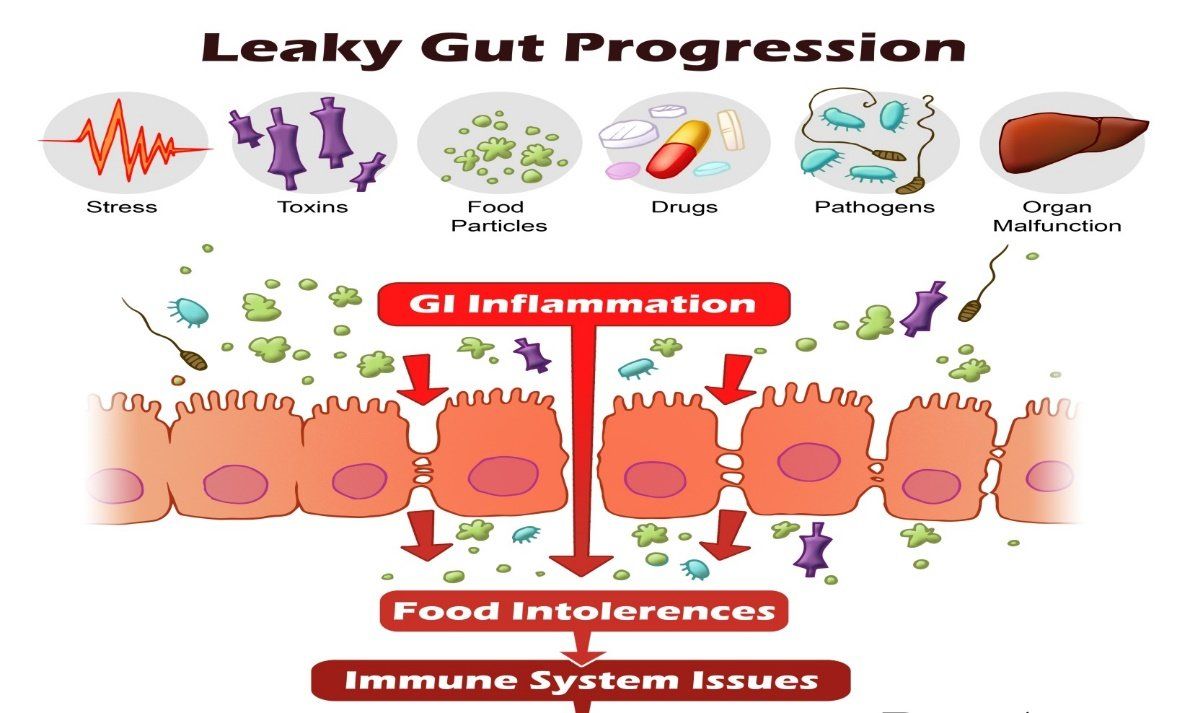Leaky What?
Leaky Gut Is Linked To Many Health Issues.
Yup, you heard right: Leaky gut. It’s exactly what it sounds like--your gut has some holes in it, and food particles, toxins, and bacteria are escaping into your bloodstream. Some refer to it as intestinal permeability. And it’s only the beginning of your problems.
Your body naturally produces this protein molecule called Zonulin. Zonulin opens up the spaces between the cells in the intestinal lining so that nutrients and other molecules can exit the intestines as they are supposed to do [1]. When leaky gut syndrome is present, these spaces open up too much, allowing things to enter your bloodstream that should never be given the opportunity. And, to add insult to injury, when this happens, an immunologic reaction occurs and the body is now primed to react to these foods and bacterium every time they appear. Great.
What causes this digestive disorder known as leaky gut? A whole lot of things, some which can’t be helped, others that can:
- Genetics — You can be predisposed to developing leaky gut because of sensitivities to environmental factors that can cause the body to initiate an autoimmune response [2].
- Poor diet and lifestyle choices — Diets that include allergens and inflammatory foods are particularly troublesome. These foods include un-sprouted grains, added sugar, GMOs, refined oils, synthetic food additives and conventional dairy products [2]. One of the primary triggers that swings the zonulin door wide open is gluten. This can affect those who have Celiac disease and to those who do not. Wheat, barley, rye and [3] alcohol [4] can also contribute to leaky gut.
- Chronic stress — Healing the HPA-D is crucial to managing stress [5], healing the gut, and ending diseases that are linked to poor gut health, such as leaky gut, heart disease, autoimmune, female hormone imbalance, chronic fatigue, weight issues and many more.
- Toxin overload — While this includes drug and alcohol consumption, that’s actually only a small part. We come into contact with over 80,000 chemicals and toxins each year, but the worst offenders for causing leaky gut are antibiotics, pesticides, tap water, aspirin and NSAIDS [2].
- Bacterial imbalance — This is also called gut dysbiosis or inflammatory gut dysbiosis, meaning there is too much harmful bacteria and not enough beneficial bacteria in your gut. One of the key jobs of beneficial gut bacteria is to communicate with and alert the immune system when something foreign, like a parasite, is looking to invade. It also keeps the opportunistic (harmful) bacteria and yeast in check, and literally protects the lining of the gut wall.
- Decreased melatonin production — This is usually caused by a lack of sunshine [3]. When sunshine hits the retina of the eye, melatonin is produced. It is stored in the pineal gland in the brain and released at night when we are in total darkness.
All diseases that are lifestyle, autoimmune diseases—Lupus, rheumatoid arthritis, chronic fatigue, psoriasis, IBS, MS, SIBO, Crohn's, Hashimotos, Graves—are caused by an imbalance in one or all three of the body systems (GI health, Detox, and Neuroendocrine). The body likes homeostasis and works to maintain it, but when there is an assault on the gastrointestinal tract then we have problems. Leaky gut means inflammation and inflammation is the root of all disease.
Here are some helpful tips that you can start using TODAY to improve your digestive system and overall gut health:
- Avoid all processed foods including gluten/wheat products. Instead, eat green vegetables at every meal, quality proteins from pastured animals, and consume healthy fats.
- Stay hydrated via a pure water source. You can buy a high-quality water filter to eliminate chlorine and fluoride [2].
- Move more. Find ways to destress and receive regular chiropractic adjustments.
- Get out in the sun and when it is time to go to sleep, sleep in a room that is completely dark, no lights, no cell phones, and no alarm clock (put it in a drawer).
- Get a GI Map and make sure to work with a practitioner who is versed in reading this test.
In my practice, one of the primary goals for all of my clients is gut integrity because without gut health, we do not have health. There are several tests that can be used to determine leaky gut. We can start by looking at a person’s blood chemistry according to functional medicine lab values (these are not the ranges printed on the lab chemistry result page). Another tool is called GI Map, a stool test that shows the comprehensive collection of microbial targets and immune markers in your digestive system that are unique to you. Once we have the data needed to determine if the gut is permeable, we heal it via proper diet, supplementation, and lifestyle modification.
- Fasano, A. (2012). Zonulin, regulation of tight junctions, and autoimmune diseases. Annals of the New York Academy of Sciences, 1258(1), 25–33. http://doi.org/10.1111/j.1749-6632.2012.06538.x
- https://draxe.com/7-signs-symptoms-you-have-leaky-gut/
- DALLAPELLEGRINA, C et al. "Plant Lectins As Carriers For Oral Drugs: Is Wheat Germ Agglutinin A Suitable Candidate?". Toxicology and Applied Pharmacology 207.2 (2005): 170-178. Web. 5 Oct. 2016.
- Swanson, G., Gorenz, A., Shaikh, M., Desai, V., Kaminsky, T., & Van Den Berg, J. et al. (2016). Night workers with circadian misalignment are susceptible to alcohol-induced intestinal hyperpermeability with social drinking. American Journal Of Physiology - Gastrointestinal And Liver Physiology,311(1), G192-G201. http://dx.doi.org/10.1152/ajpgi.00087.2016
- Silva, S., Robbe-Masselot, C., Ait-Belgnaoui, A., Mancuso, A., Mercade-Loubiere, M., & Salvador-Cartier, C. et al. (2014). Stress disrupts intestinal mucus barrier in rats via mucin O-glycosylation shift: prevention by a probiotic treatment. AJP: Gastrointestinal And Liver Physiology, 307(4), G420-G429. http://dx.doi.org/10.1152/ajpgi.00290.2013
Don't Miss Out On More!

Heidi Toy FNTP
I help people all over the world heal by identifying and treating the root cause of their body imbalances. Through diet and nutrition, I guide them towards wholeness and balanced lives.
Heidi Toy Functional Medicine Blog

For many of us, our experience with food comes with some sort of baggage. Maybe you eat to cope with stress, anxiety or depression. Maybe you’ve grown up with value-words placed on food such as “junk” and “healthy,” and told you couldn’t eat the “good stuff” (brownies and ice cream) until you finished the “yucky stuff” (broccoli and lettuce). Or, even more serious, maybe you or a loved one has struggled or is struggling with an eating disorder. Food is amazing and life-giving. It can be used as a means to celebrate, socialize, or simply just provide fuel for the body. Our relationship with food shouldn’t be a difficult one, it should be an enjoyable one. A way to get to that healthy place in your relationship is to practice mindful eating. Mindfulness is a Buddhist concept of mediation that can help you recognize emotions and physical sensations present. Through mindful eating, you can learn to truly pay attention to your experiences, cravings and physical cues. The basics of mindful eating are: Eat slowly, without distraction. If you are eating with others, take a least five minutes at the start of the meal to enjoy the food on your plate before engaging in discussion. Pay attention to your body--are you still hungry, or are you getting full? Learn to distinguish between cravings and true hunger. Use all your senses when you sit down to a meal. Make an effort to notice how the food looks, smells, tastes, feels in your mouth, and sounds when you chew. Appreciate your food, who has prepared it (even if it’s you--what an accomplishment!), and where it comes from. Being mindful of your experience will help you slow down while eating. This can prevent overindulgence by making the act of eating intentional instead of automatic. It will also help you become aware of triggers that make you want to eat (are you truly hungry at 9pm every night when you sit down to watch that Netflix show, or do you just pour yourself a bowl of Chex Mix because that’s what you always do?). Knowing your triggers can give you time to process what’s truly going on and the ability to react properly.

Here are the essential functional medicine steps for Fifth Disease! If your child comes home with bright red cheeks that look like they’ve been “slapped,” chances are they may have fifth disease, also known as erythema infectiosum. This mild viral illness, caused by parvovirus B19, is common in kids and often spreads t

Successfully healing Adrenal Fatigue requires a holistic approach focussed on fixing the root cause of your problems and supporting your body through the healing process. This means we are going beyond just temporary symptom relief. We want you to return to vibrant health so you can get back to the active and healthy lifestyle that Adrenal Fatigue is holding you back from. (Adrenal Fatigue is more accurately known as HPA-D. Check out my blog HPA-D vs Adrenal Fatigue to learn more.)Again, we would be completing further testing to get to the root cause of your issues, but this protocol is a great starting point for healing. We focus on five essential areas for fast and long-term healing.

I want it! Sooooooo bad. But I want to lose weight, too. It’s not on my list of healthy, squeaky clean healing foods, but what will one little bite hurt? I can start again fresh and clean tomorrow. When brownies call your name and you are trying to break up with them, it is difficult to avoid the urge to want to indulge. But you know if you give in that you will berate yourself with guilt for the next 24-48 hours and the tsunami of eating everything off-plan will take over your life. One bite will start an avalanche... But you just can't stop thinking about the pan of brownies you made for the kids.

Did you know most people didn’t have refrigerators in their homes until well into the 1900’s? It wasn’t even invented for large scale commercial use until the mid 1800’s [1]. So how did people keep their milk cold and make their food last longer? Fermentation. It sounds like a gross concept, because we often associate fermentation with a bad odor, but foods like cheese, yogurt, sauerkraut and pickles are all fermented foods. And those aren’t gross, are they? Well, some might disagree with me about sauerkraut, but that’s beside the point. Fermented foods are digestive aids. Microscopic living organisms in fermented foods help extend the food’s shelf life, enhance flavor, and help the body absorb minerals. These organisms pre-digest the food, getting rid of harmful components, and create more vitamins and enzymes than the food began with. Enzyme-rich foods have many benefits including [2]: Increase digestibility of food we eat Boost immune system Increase alkalinity; neutralizing pH levels Provide a healthy balance of friendly flora in the gut (Learn more about your microbiome in my other blog posts ) Tone the colon and help with elimination Control cravings for unhealthier foods Eliminate toxins and undigested wastes in the body In the “old days,” people use to ferment all kinds of foods through pickling, canning, pasteurization and added salt. Nowadays, however, large scale fermentation has lost many of its nutritious benefits due to the need for speed to get the product on the shelf as fast as possible and as cheap as possible. The only true fermented foods you will find are sauerkraut, kombucha, yogurt and kefir, beans, wine and beer, some meats (such as salami and pastrami), legumes and nuts (such as tofu, soy sauce and miso), sourdough bread, and various kinds of vegetables [3]. Fun facts about sauerkraut: The Germans “stole” it from the Chinese! Sauerkraut (probably not labeled as such for the Chinese, but the same recipe) was one of the main foods for those who built the Great Wall of China. Genghis Khan brought it to Eastern Europe during an invasion. It also contains high levels of vitamin C, and sailors often took it on long journeys to prevent scurvy.

How can we best keep blood sugar stable? Do what our body is designed to do – use fat for energy. Our species did not survive the Ice Age because of vanilla coffee lattes and cheesecake. Throughout most of our history, we ate a diet that was likely 50-70 percent fat. Look at the old family photo albums, specifically pictures of people in the first half of the 1900s, before we had so many processed foods. You won’t see many fat people--in fact, most look darn skinny. If they lived on the farm, they ate lots of eggs, meat, milk, and vegetables out of their own backyards. “Diet foods” were non-existent. Heart disease was almost non-existent. Our metabolism is designed to work much better with fats better than with sugar. Fats provide the slow and steady fuel our body likes to use for energy. Think of fats as a slow-burning log on the fire. One log (i.e. one meal containing fats) lasts for hours. Starchy carbs, on the flip side, are like kindling. You constantly have to throw more twigs (chips, pasta, bagels) to keep the fire burning. The first step is to know your sugars by reading the labels, and then avoid said sugars as much as possible.









































































































